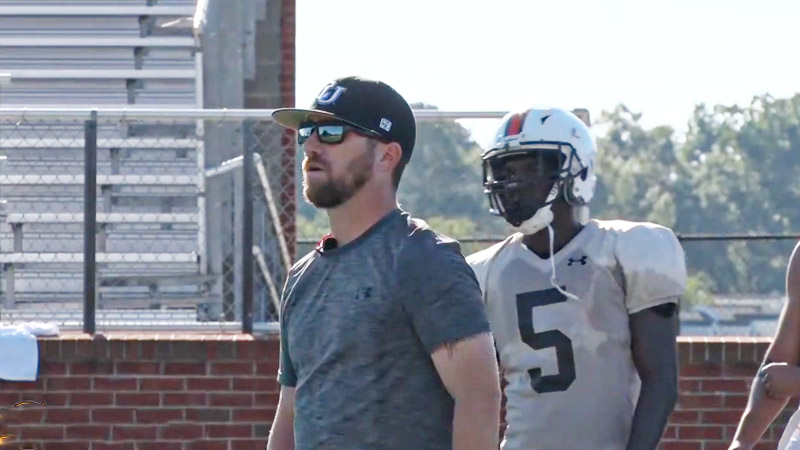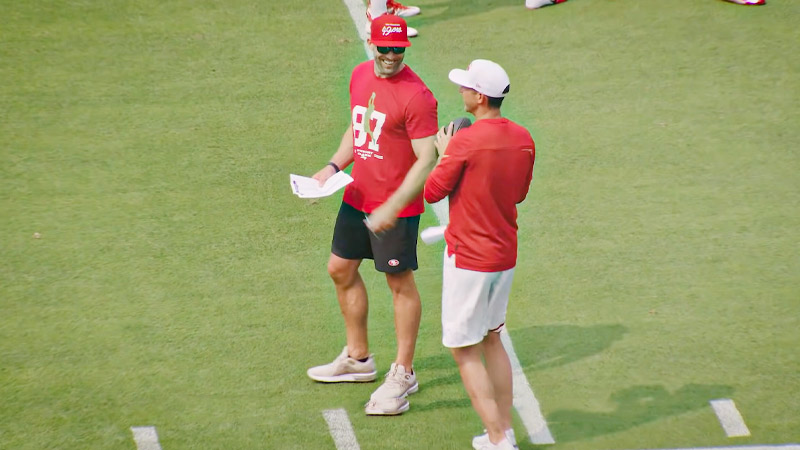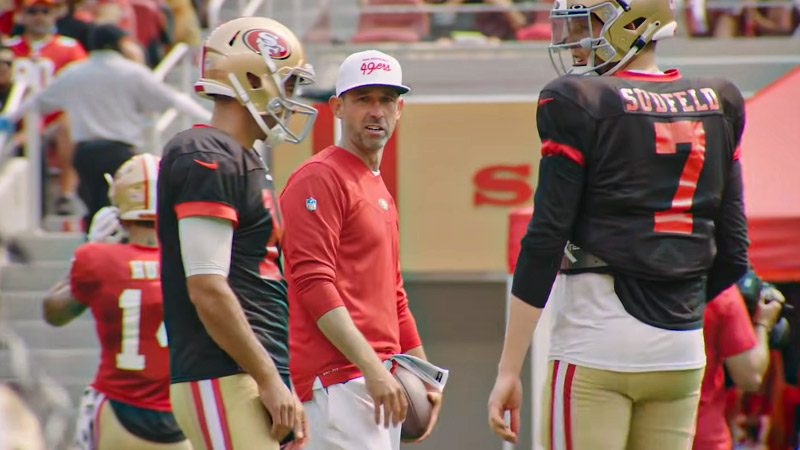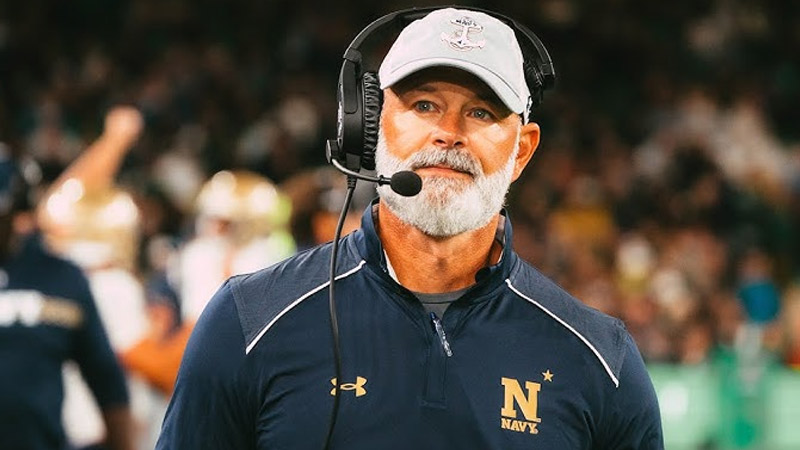In the dynamic world of American football, success on the field is not solely determined by the strength of individual players or the team’s physical prowess. A strategic mastermind known as the football offensive coordinator stands at the forefront of shaping the team’s offensive prowess.
This individual is more than just a play-caller; they are a strategist, a leader, and a driving force behind the team’s ability to score points and dominate the game.
In this blog post, we delve into the multifaceted role of a football offensive coordinator, exploring their responsibilities, impact on team performance, and the strategic acumen they bring to the gridiron. Stay focused.
Who Is the Football Offensive Coordinator?
The football offensive coordinator is a key coaching position in American football, responsible for devising and implementing the team’s offensive game plan. This role involves designing strategies, formations, and plays to move the ball down the field and score points.
The offensive coordinator collaborates closely with the head coach and other offensive coaches to create a cohesive strategy that aligns with the team’s strengths and the opponent’s weaknesses.
They analyze game footage, player performance, and opponent tendencies to make informed decisions during games. Effective communication and adaptability are crucial, as the offensive coordinator must adjust tactics based on real-time developments.
This role requires a deep understanding of football strategy, player capabilities, and the ability to make quick decisions under pressure.
Roles and Responsibilities of Football Offensive Coordinator

The football offensive coordinator in American football holds a vital position within the coaching staff, overseeing the offensive strategy and play-calling. Their roles and responsibilities include:
Game Planning
The offensive coordinator collaborates with the head coach and offensive staff to develop a comprehensive game plan for each upcoming opponent. This plan includes selecting plays, formations, and tactics that exploit the opposing team’s weaknesses.
Play Calling
During games, the offensive coordinator is responsible for calling plays that capitalize on the situational context, such as down and distance, field position, and game situation. Their decisions directly impact the team’s ability to move the ball and score points.
Strategy Development
The offensive coordinator creates a strategic framework for the team’s offensive approach, taking into account the strengths and weaknesses of the team’s own players as well as those of the opposing defense.
Player Development
Working closely with position coaches, the offensive coordinator helps develop the skills and techniques of the offensive players. They ensure that players understand their roles within the offensive system and continuously improve their performance.
Film Study
The offensive coordinator analyzes game footage and studies opponent tendencies to identify potential advantages and weaknesses in the opposing defense. This analysis informs the game plan and play-calling decisions.
In-Game Adjustments
The offensive coordinator must be adept at making real-time adjustments during games based on how the opposing defense is reacting to their strategies. This might involve changing play calls, formations, or personnel groupings.
Communication
Effective communication is crucial. The offensive coordinator must relay play calls to the quarterback and the rest of the offense quickly and clearly, often using signals or headsets.
Collaboration
The offensive coordinator works closely with the quarterback coach, offensive line coach, wide receiver coach, and other offensive staff to ensure that all players understand their roles and execute the plays effectively.
Player Evaluation
The offensive coordinator assesses player performance, identifies strengths and areas for improvement, and adjusts the game plan accordingly. They might also make decisions about player substitutions and rotations.
Scouting Reports
The offensive coordinator contributes to scouting reports on opposing defenses, highlighting key players and strategies to exploit or counter.
Time Management
During the game, the offensive coordinator helps manage the team’s clock and timeouts, ensuring that the offense operates efficiently and maximizes scoring opportunities.
Adaptability
Football games can be unpredictable, so the offensive coordinator must be able to adjust their strategies on the fly based on changing circumstances.
So, the football offensive coordinator is a strategist, tactician, and motivator, orchestrating the team’s offensive efforts with the goal of consistently moving the ball and putting points on the scoreboard.
How to be a Skilled Football Offensive Coordinator

Becoming a skilled football offensive coordinator requires a combination of football knowledge, strategic thinking, communication skills, and leadership qualities. Here’s a roadmap to help you on your journey:
Deep Football Knowledge
- Develop a comprehensive understanding of offensive football concepts, formations, and strategies.
- Study different offensive systems (e.g., spread offense, pro-style offense) and their intricacies.
- Learn about player positions, responsibilities, and how they interact within an offensive scheme.
Continuous Learning
- Stay updated on evolving trends and strategies in football through books, articles, videos, and coaching clinics.
- Study the successes and failures of prominent offensive coordinators and teams to gain insights.
Strong Communication
- Develop clear and effective communication skills to convey game plans and play calls to players quickly and accurately.
- Foster open communication with players, coaches, and staff members to ensure everyone is aligned.
Game Film Analysis
- Develop expertise in analyzing game film to identify opponent tendencies, weaknesses, and opportunities for exploitation.
- Understand how to break down plays and formations to make informed decisions.
Strategic Thinking
- Learn to think strategically by understanding situational football (e.g., red zone, third down) and making decisions that maximize your team’s chances of success.
- Develop the ability to anticipate opponents’ reactions and adjust your strategy accordingly.
Attention to Detail
Pay close attention to nuances such as player matchups, defensive alignments, and timing to make precise play-calling decisions.
Adaptability
Be flexible and adaptive in your approach, ready to adjust game plans based on real-time developments and opponent adjustments.
Player Development
- Understand the strengths and weaknesses of your players and design plays that capitalize on their abilities.
- Work closely with position coaches to ensure players are improving their skills and techniques.
Leadership Skills
- Develop strong leadership qualities to inspire and motivate players, coaches, and staff members.
- Build trust and respect by leading by example and demonstrating a strong work ethic.
Time Management
Learn how to effectively manage the clock, timeouts, and play calling to optimize scoring opportunities.
Collaboration
Foster a collaborative atmosphere with fellow coaches, seeking input and insights from different perspectives.
Game Situations
Practice decision-making under pressure by simulating game situations during practice and studying how successful coordinators handle similar scenarios.
Networking
Attend coaching clinics, seminars, and workshops to connect with other coaches and gain valuable insights.
Mentorship
Seek mentorship from experienced coaches who can provide guidance, feedback, and real-world advice.
Experience
- Gain experience by starting at lower coaching levels, working your way up, and consistently honing your skills.
- Becoming a skilled football offensive coordinator requires dedication, continuous improvement, and a passion for the game.
Significance of a Football Offensive Coordinator

The role of a football offensive coordinator is of immense significance within a team’s coaching staff and its overall success. Here’s why the offensive coordinator holds such importance:
Game Strategy
The offensive coordinator devises the team’s offensive game plan, determining which plays to run, formations to use, and strategies to employ against the opponent’s defense. Their decisions heavily influence the team’s ability to move the ball and score points.
Play Calling
During games, the offensive coordinator’s play-calling directly impacts the outcome. They must make split-second decisions based on various factors, such as down and distance, field position, and defensive alignment, all of which affect the team’s offensive efficiency.
Adaptability
The coordinator adjusts the game plan in real-time based on the opponent’s reactions and performance. This adaptability is crucial for exploiting weaknesses, countering defensive adjustments, and seizing opportunities.
Player Development
The offensive coordinator plays a pivotal role in developing the skills and potential of offensive players. They work closely with position coaches to improve players’ techniques, understanding of the system, and overall performance.
Communication
Effective communication skills are essential for the offensive coordinator. They relay play calls to the quarterback and the offense quickly and clearly, ensuring smooth execution on the field.
Strategic Thinking
The coordinator’s strategic thinking influences the team’s success in critical situations, such as red-zone opportunities, two-minute drills, and crucial third-down conversions.
Team Cohesion
A well-structured offensive scheme enhances team cohesion, as players understand their roles and responsibilities within the system. The coordinator ensures that players work together cohesively to achieve common goals.
Scouting and Analysis
The coordinator studies game film to identify opponent tendencies, strengths, and weaknesses, helping the team exploit favorable matchups and anticipate defensive strategies.
Maximizing Talents
The coordinator tailors the offensive strategy to leverage the strengths of individual players, maximizing their contributions to the team’s success.
Time Management
Managing the clock effectively during games is crucial, and the coordinator’s decisions influence the pace of play, timeouts, and overall game management.
Pressure Handling
The offensive coordinator operates under intense pressure, making high-stakes decisions in front of a large audience. Their ability to remain composed and make sound judgments impacts the team’s performance in critical moments.
Overall Team Performance
The offense’s ability to control the game, sustain drives, and score points directly impacts the team’s chances of winning. A well-coached offense can provide a significant advantage in competitive matchups.
Player Motivation
The coordinator’s leadership and motivational skills inspire players to give their best effort on the field. Their confidence in the offensive plan can boost players’ self-assurance and performance.
Team Identity
The offensive coordinator contributes to shaping the team’s identity and style of play. A strong offensive identity can make the team more recognizable and create a fan base around a particular playing style.
FAQs
What exactly does a football offensive coordinator do?
A football offensive coordinator is responsible for crafting the team’s offensive game plan and devising plays, formations, and strategies to outsmart the opposing defense. Their decisions influence the team’s ability to move the ball and score points.
How does play-calling work during games?
Play-calling is a dynamic process where the offensive coordinator makes real-time decisions based on game situations, the opponent’s defensive alignment, and player strengths. Their choices dictate the plays executed on the field.
What skills are essential for an effective offensive coordinator?
An effective offensive coordinator needs a deep understanding of football strategy, strong communication skills, adaptability, strategic thinking, leadership qualities, and the ability to analyze game film and opponent tendencies.
How does an offensive coordinator contribute to player development?
The offensive coordinator collaborates with position coaches to enhance player skills and techniques. They tailor plays to highlight individual player strengths, contributing to the overall improvement of the team’s offensive performance.
Why is the role of an offensive coordinator so crucial to a team’s success?
The offensive coordinator’s influence on game strategy, play-calling, player development, and overall team performance is immense. Their decisions impact the team’s ability to control the game, score points, and ultimately secure victories.
Wrapping Up
From designing game plans that exploit opponent weaknesses to calling plays that maximize scoring opportunities, the football offensive coordinator is an indispensable figure in the world of American football.
Their strategic prowess, leadership qualities, and ability to adapt to ever-changing game situations make them the driving force behind a team’s offensive excellence.
As we’ve explored the intricacies of this crucial role, it’s clear that a skilled offensive coordinator holds the key to unlocking a team’s full potential on the field. Best of luck.







